Co-hosted by the Beijing International Film Festival Organising Committee, the Chinese Olympic Committee and the Beijing Olympic City Development Association (BODA), the Theme Forum of the 21st Beijing International Sports Film Week (BISFW) was successfully held at Vintage, Chaoyang District, Beijing, on 18 April 2025. The theme of the forum was “The Olympics Through the Lens of Film”. Gao Yunchao, Deputy Secretary-General of BODA and Deputy Director-General of the Beijing Olympic City Development Centre, attended the event, alongside experts and representatives from various fields such as film and TV production, cultural and sports tourism, media and capital.
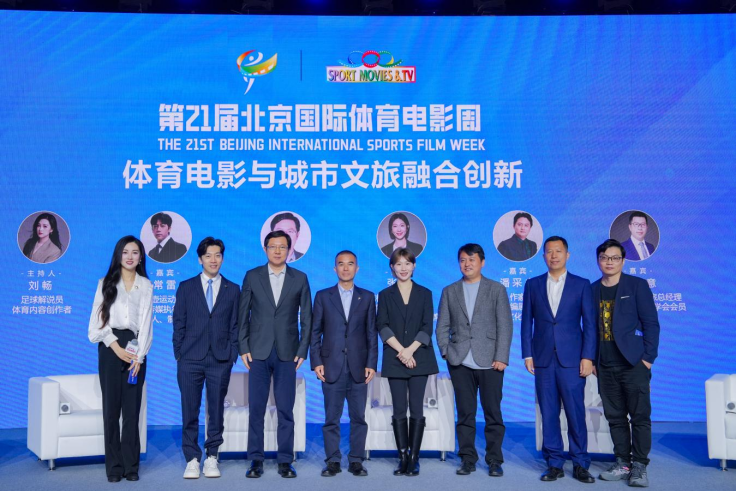
(A group photo of VIPs)
The Theme Forum took place on the morning of 18 April, under the theme of “Global Narratives and Cross-Cultural Communication of Sports Films Driven by AI Technology”. It was attended by Yu Jianhong, member of the Standing Committee of the Party Committee and Vice President of Beijing Film Academy; Wu Minxia, Olympic champion, national youth sports ambassador and ambassador of the 21st BISFW; Yu Baimei, well-known director; Zhang Xiaobei, director and pioneer in science fiction film; and Song Fangjin, famous screenwriter. The panellists discussed how films can build bridges for cross-cultural dialogue in the age of intelligence. They concurred that sports film, as a medium that transcends linguistic and cultural barriers, could turn local stories into global narratives with the aid of AI and therefore, act as a vital means of spreading the Chinese spirit and promoting mutual learning among civilisations.
Yu Jianhong stated that AI not only provides efficient tools for filmmaking but also possesses data analysis and deep learning capabilities to help creators accurately capture the aesthetic demands of audiences from different cultural backgrounds. This technology offers technical support for sports films to overcome geographical limitations and build global stories.
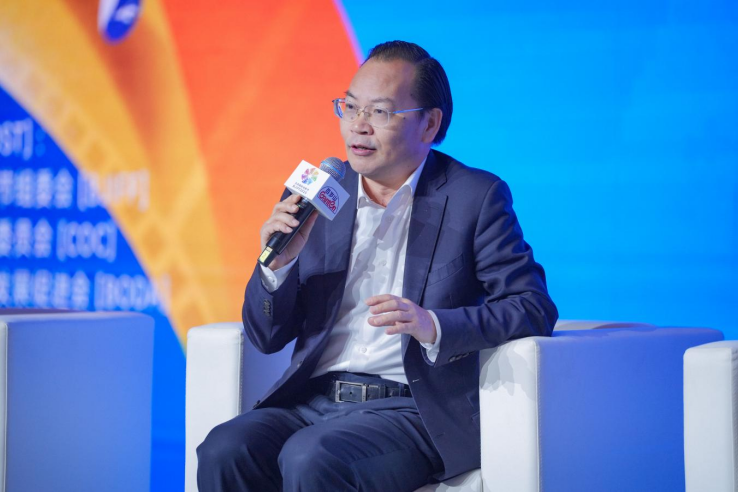
(Yu Jianhong speaks)
Reflecting on her personal journey, Wu Minxia highlighted that the essence of sports films lies in humans. The application of AI, she believes, should be geared towards telling true stories and enhancing the emotional connection with characters, so viewers from various cultural backgrounds can truly feel the impact of sports.
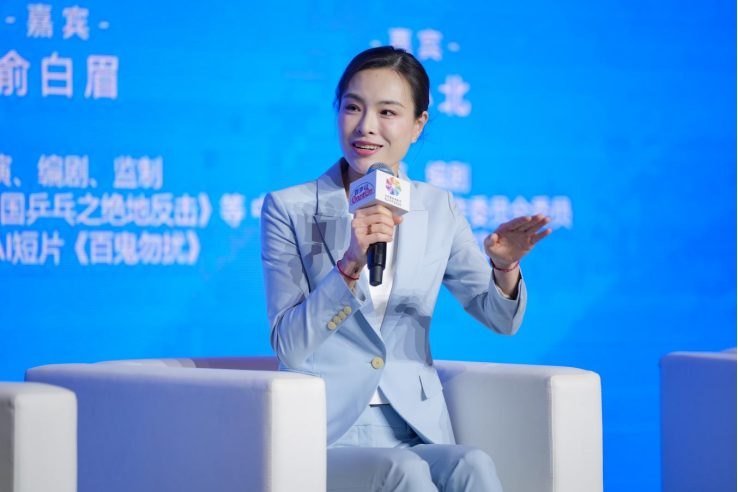
(Wu Minxia speaks)
Taking his new film Ping Pong: The Triumph as an example, Yu Baimei shared how AI technology can be used to refine scriptwriting and visual presentation, combining intense sports competition with humanistic care. He revealed that his team has been piloting the use of AI to generate short films and exploring the potential of technology to enhance content production.
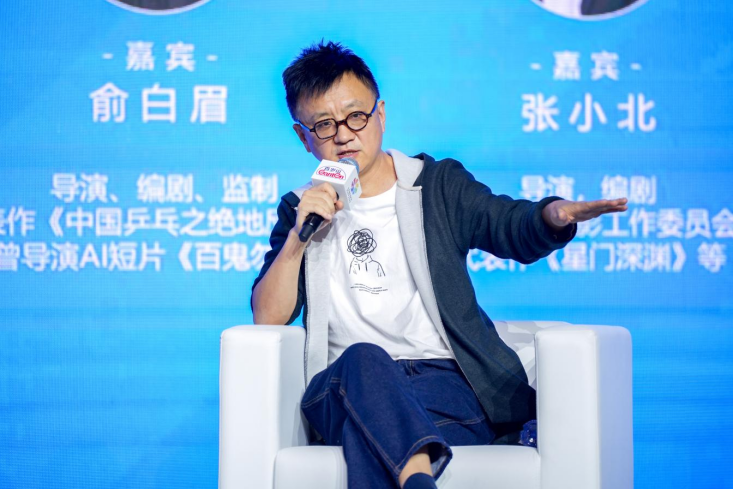
(Yu Baimei speaks)
Speaking of innovation in genre films, Zhang Xiaobei pointed out that AI unlocks new vistas for sports films. “Science fiction and sports may seem irrelevant, but essentially, they both concern the courage of humans pushing the envelope. AI not only enhances the efficiency of special effects production but also helps creators construct futuristic narrative settings, expanding the boundaries of sports films.” The film Star Abyss he directed, among others, exactly represents the direction of combining technology with art.

(Zhang Xiaobei speaks)
From the standpoint of content creation, Song Fangjin stated that AI’s script generation and data analysis capabilities can help creators overcome cultural barriers and find ways to express universal values. “Whether it’s the patriotism and national pride in the film Medal of the Republic or the nuanced social observation in Cell Phone, AI enables these stories to resonate more precisely with audiences around the world.
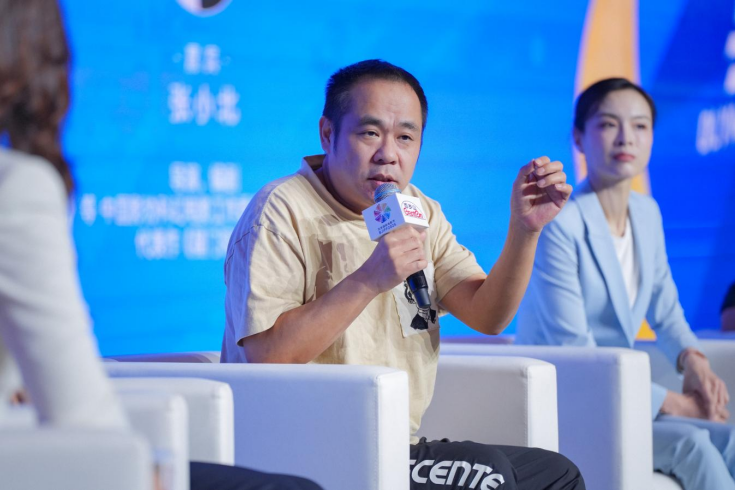
(Song Fangjin speaks)
A panel meeting themed “Innovation in the Integration of Sports Films and Cultural Tourism” was held on the afternoon of 18 April, where the panellists shared insights on how film and television can tap into the value of city image, inject vitality into city development and open new opportunities for the cultural tourism industry. They included Li Tingwei, General Manager of Poly Film and Special Researcher at the Research Centre for China’s Industrial Development, Tsinghua University; Zhang Dan, world champion in figure skating, silver medallist at the Turin 2006 Winter Olympics and lead actress in the ice dance drama Dream to Glide; Chang Lei, former curling athlete, Executive Director of Haixi Media, host and producer; Pan Caifu, writer, screenwriter and senior cultural media professional; and He Zhaoyi, General Manager of Gaotu Culture and Tourism, Gaotu Techedu Inc.
Li Tingwei presented case studies including the hit films YOLO and Pegasus and put forward a “film + sports + cultural tourism” integration strategy. He emphasized that sports films should embody stories, emotions and spirit, seamlessly blending a city’s unique charm with its cultural tourism offerings. He also introduced a “threefold value” framework: (1) Emotional value: captivating audiences with compelling content; (2) Sentimental value: striking a chord with audiences; and (3) Nostalgic value: shaping audience perspectives through shared memories and experiences. Using the analogy of a “catering ecosystem”, Li likened short videos to fast food, TV series to home-cooked meals and cinematic experiences to elaborate feasts, which cater to the diverse tastes and needs of different audiences.
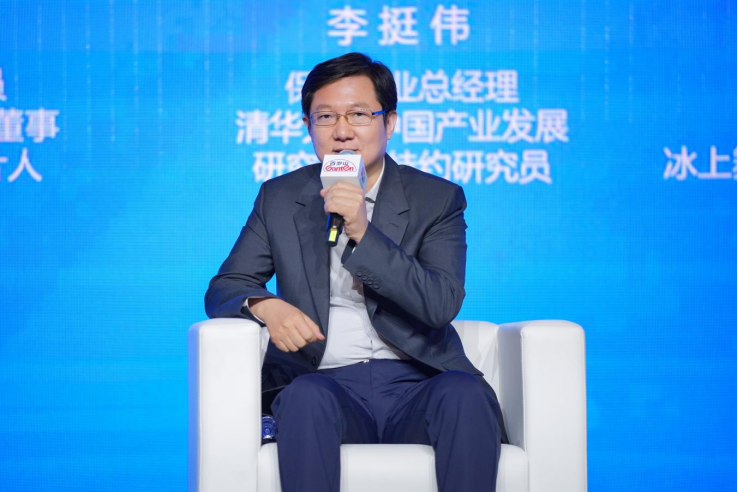
(Li Tingwei speaks)
From an athlete’s perspective, Zhang Dan emphasized the importance of empathetic storytelling. She noted that professional competition needs to project emotions onto ordinary people in order to effectively communicate the universal value of the sporting spirit. She recommended placing character growth at the heart of the narrative, arguing that stories of failure resonate more deeply with audiences than those of victory, and the journey of self-overcoming is the core of the sporting spirit.

(Zhang Dan speaks)
Taking the documentary Tough Out as an example, Chang Lei stressed the emotional impact of subtle scenes, noting that even a single tree or a simple gesture can connect the city with audiences. He believes that sports are the vehicle and film is the essence, calling on creators to strike a balance between professional expertise and mass appeal.
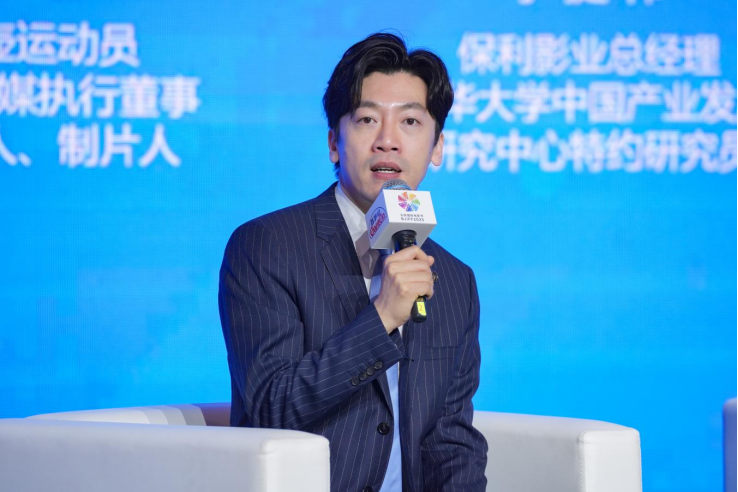
(Chang Lei speaks)
Pan Caifu used classic films Roman Holiday and Casablanca as examples to illustrate the symbiotic relationship between classic works and urban culture. He emphasized that film licensing needs to be rooted in the cultural DNA of a city. For instance, the combination of the literary heritage of Notre-Dame de Paris with innovative visual storytelling in the sports short film ignites the cultural vitality. Based on his own creative practice, Pan proposed a methodology called “Extraordinary People, Extraordinary Stories, Extraordinary Scenes” and shared his experiences of weaving elements such as the preservation of Luoyang’s historical relics and the traditions of the Yi ethnic group into sports narratives.
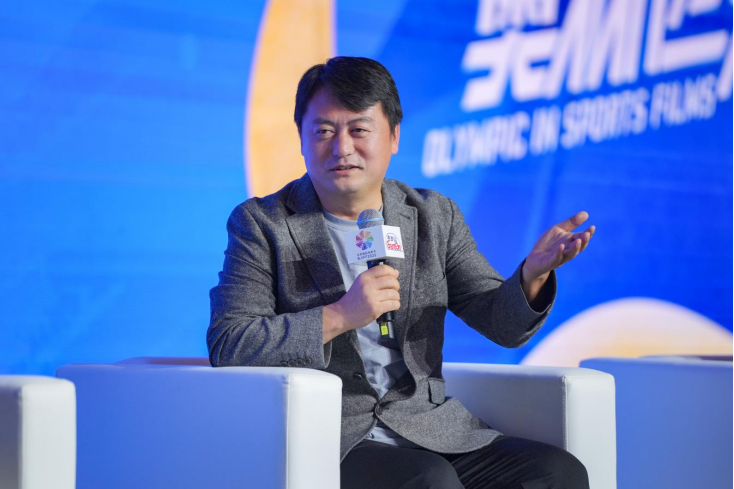
(Pan Caifu speaks)
He Zhaoyi proposed the concept of “dynamic activation of static landscapes”, likening a city to a textbook and sports films to narrators. The success of Guizhou’s Village Football Super League demonstrates that the passionate stories of ordinary people also have the power to create cultural and tourism landmarks. Furthermore, he envisioned a new model of “education + cultural tourism”, recommending that study tours be conducted to engage youngsters with the film industry and the sporting spirit.
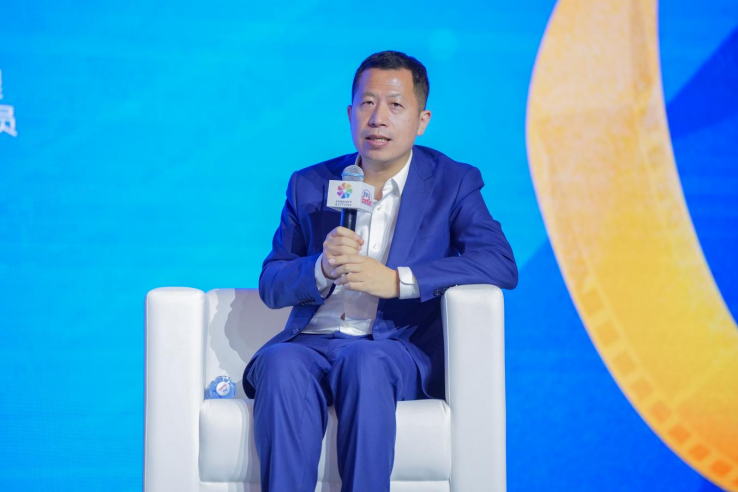
(He Zhaoyi speaks)
The 21st Beijing International Sports Film Week Collection of Works will be launched soon. Organisations and individuals interested can check out relevant information by visiting the “Beijing International Sports Film Week” section on BODA’s website. The submission period for entries will last until 10 June 2025, and the selection and announcement of shortlists is scheduled for July. Winning entries may be recommended to compete in the World Champion Final of the Sport Movies and TV 2025 – 43rd Milano International FICTS Fest. There is also a chance that they will be featured in the public screenings organised by the Beijing International Film Festival and the BISFW at universities and communities across the country.
On behalf of the hosts, Gao Yunchao introduced that film consumption is a key theme of this year, and the BISFW will add new elements to enrich the subsequent Beijing Sports Shopping Carnival. In addition to sports film screenings, there are also diverse, innovative experience and display activities. For example, at the marketplace of the Beijing Olympic Museum, visitors can get a better understanding of the museum. In the display and experience zones for Teqball, visitors, especially young people, can engage with this emerging sport, offering them a new fitness option. During the Beijing International Film Festival, a number of excellent sports films will be screened, including Unstoppable (a documentary about China’s MMA fighter Zhang Weili), Eephus (a film about amateur New England baseball teams), and Le Rendez-vous de l'été (That Summer in Paris).
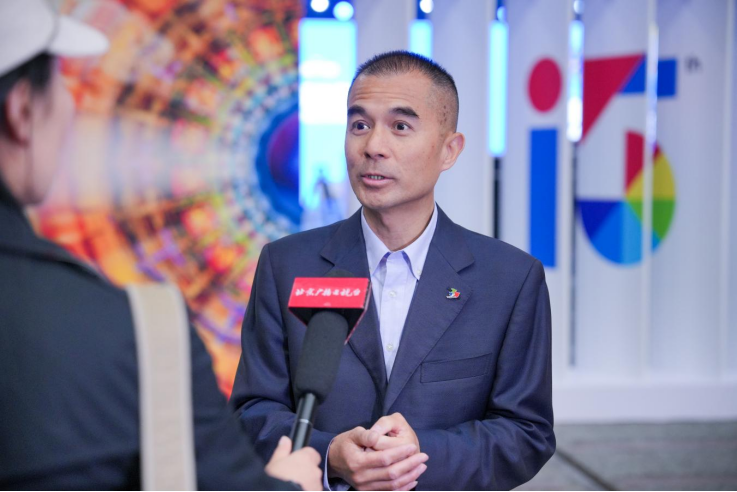
(Gao Yunchao speaks to media)
The BISFW is an Olympic themed flagship programme launched in 2005. Since its 18th edition in 2022, the BISFW has been officially included in the Beijing International Film Festival. On 9 November 2024, Chinese sports films Hi, Asian Games – Female and Invisible Summit, recommended by the 20th BISFW, received the Guirlande d’Honneur Award, and Football on the Roof and Karate Source won the “Mention d'Honneur” Award at the World Champion Final of the Sport Movies and TV 2024 – 42nd Milano International FICTS Fest. The main activities of the 21st BISFW will run from April to July. In April, the Collection of Works, joint fund for sports films, and opening ceremony will be launched, coupled with some events in partnership with the Beijing International Film Festival. Starting in July, shortlists will be announced, and public screenings will take place at the Beijing Olympic Museum, the China National Film Museum, and other venues, which will continue into December.
Appendix: Event Schedule of the 21st Beijing International Sports Film Week

© Copyright 2020. All rights reserved
Beijing Olympic City Development Association.All rights reserved.Beijing ICP 11016671 No.